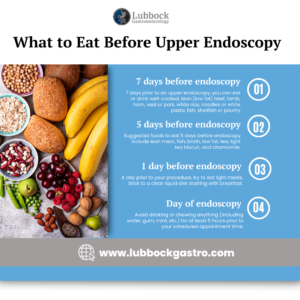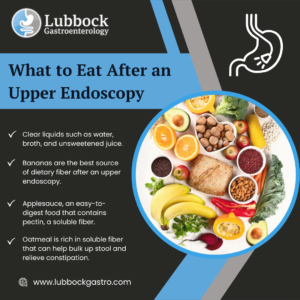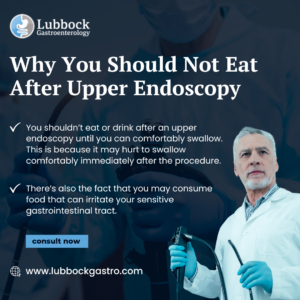When would I need an upper endoscopy?
You may need an upper endoscopy if you’re bleeding in the upper digestive tract, experiencing abdominal pain, nausea, vomiting, or having problems with swallowing.
You may also need an upper endoscopy for direct view when tissue biopsies need to be taken from your upper gastrointestinal tract.
Upper endoscopy is also accurate in diagnosing gastroesophageal reflux disease or GERD) and heartburn, cancerous and noncancerous tumors, inflammation, such as esophagitis, gastritis and duodenitis, peptic ulcer diseases, and other gastrointestinal disorders.
Healthcare providers can also provide treatments with an endoscope. So you may need upper endoscopy in the management of upper digestive tract bleeding, stretch narrowed digestive tracts, and to remove polyps, tumors, or swallowed objects.
Medical professionals know when exactly you need an upper endoscopy. You can present your symptoms to your physician and seek professional help.
What to Eat Before Upper Endoscopy

What to Eat Before Upper Endoscopy
7 days before endoscopy
Preparation is essential for achieving the best results for an upper endoscopy. Dietary protocols are an essential component of preparing for an endoscopy. Opt for a low-residue diet of meat, poultry, fish, cornflakes, vegetables, and fruit.
7 days prior to an upper endoscopy, you can eat or drink well-cooked, lean (low fat) beef, lamb, ham, veal or pork, white rice, noodles or white pasta, fish, shellfish or poultry, cereal including cornflakes and crisped rice cereal, white bread or toast, rich tea or other plain biscuits, eggs, especially boiled or poached, soya or tofu, gravy made from stock cubes, butter, margarine or cheese, milk, cream or cottage cheese, potatoes without the skins, sweetener, clear jelly water, cordial, fizzy drinks, clear strained soup or clear stock.
In addition to these food items, you should avoid taking supplements one week beforehand.
5 days before endoscopy
Suggested foods to eat 5 days before endoscopy include lean meat, fish, broth, low fat, tea, light tea biscuit, and chamomile.
If you take any diabetic medicine, such as insulin or blood-thinning medicine such as aspirin, or warfarin, check with your physician to know if there’s a need for a change to the dosage of your medication, or if you have to stop the medication before your procedure.
Foods to avoid during these days include pork meat, fried foods, aged cheeses, fast foods such as burgers, and paninis, and roasted, deep-fried potatoes (including chips, crisps, alcohol, jam, red jelly, and red cordial or fruit juice.
1 day before endoscopy
A day prior to your procedure, try to eat light meals. Stick to a clear liquid diet starting with breakfast. Samples of clear liquids include plain jello, soda, popsicles of any color other than red or orange, clear broth, powdered drinks like lemonade, kool-aid, crystal lighting juice without pulp, no red or orange drinks, sports drinks such as Gatorade or Powerade, ordinary coffee and drink with no creamer and sugar.
Drink as many fluids as you can a day before your endoscopy. Fruit, including fresh, dried, and canned, brown rice or brown pasta, high-fiber breakfast cereals, pulses, or lentils, high-fiber, multi-seeded, 50/50 or wholemeal bread, vegetables, nuts, or seeds shouldn’t be part of your diet at this point.
Eat a light meal for supper, and opt for soft foods like mashed potatoes, and Jello, the night before the procedure. Do not eat or drink anything that’s red in color during this period.
Day of endoscopy
Ensure you’ve followed all the colon cleansing instructions given to you by your provider. Your colon cleansing should be completed 4 hours prior to your scheduled arrival time at the clinic.
Avoid drinking or chewing anything (including water, gum, mint, etc.) for at least 5 hours prior to your scheduled appointment time. Do not eat or drink anything after midnight or the morning of your test.
What to Eat After an Upper Endoscopy

What to Eat After an Upper Endoscopy
Upper endoscopy is a quick procedure especially when used for diagnostic purposes. By the time you’re done with the procedure, it would’ve been at least 7 hours since you last had anything to eat or drink.
You may be hungry or thirsty by this time. However, you’re not to eat or drink anything until you can comfortably swallow. The exact time that you can start eating again after an upper endoscopy depends on your appetite and your recovery speed.
Additionally, if your throat has been sprayed with numbing medication, you won’t be able to eat anything immediately after the procedure. When you feel you’re fine to start, take things easy.
Experts recommend you start by sipping water or other cool liquids. Over the next 24-48 hours, you can start eating small meals consisting of soft, easily digestible foods like soups, eggs, juices, pudding, applesauce, etc.
Do not take alcohol for at least 24 hours after your procedure. You may resume your normal diet when you feel like you’ve fully recovered.
The food to eat after an upper endoscopy includes:
- Clear liquids such as water, broth, and unsweetened juice. These foods are easy to digest and they help keep the body hydrated.
- Bananas are the best source of dietary fiber after an upper endoscopy.
- Applesauce, an easy-to-digest food that contains pectin, a soluble fiber, promotes bowel regularity.
- Oatmeal is rich in soluble fiber that can help bulk up stool and relieve constipation.
- White rice is an easily digestible form of starch that you can consume as soon as you’re comfortable swallowing.
Why You Should Not Eat After Upper Endoscopy

Why You Should Not Eat After Upper Endoscopy
You shouldn’t eat or drink after an upper endoscopy until you can comfortably swallow. This is because it may hurt to swallow comfortably immediately after the procedure. There’s also the fact that you may consume food that can irritate your sensitive gastrointestinal tract.
Once you give it enough time, like say after a few hours, you can then start eating. Generally, it is recommended that you stick to a soft or bland diet for the first few days after your upper endoscopy.
Go for light food options, and give your gastrointestinal system time to recover from the probing. Opt for a light breakfast or lunch after getting home from the procedure.
Stay away from food that’s too heavy or puts undue pressure on your gastrointestinal tract. It’s also necessary to avoid spicy, fried, or fatty foods that can irritate the digestive tract and cause discomfort during your recovery period.
You should also avoid alcohol and caffeine immediately after an upper endoscopy. Right after the procedure, you can start consuming fluid and enough water to help relieve your intestinal tract.
Is a six-hour fast after a rice meal sufficient before an upper endoscopy?
Rice is the staple diet and endoscopic dietary guidelines recommend a 6-hour fast for solids such as rice before an upper endoscopy procedure.
Certain research seems to think these guidelines focus on a specific population and recommend fasting for 10 hours before an upper endoscopy to improve your gastroenterologist’s view.
I Have Diabetes. Can I Take Insulin on the Day of My Upper Endoscopy?
Experts recommend you don’t take any diabetes medicine until after your test is done and until you start eating again.
Some providers will also tell you to reduce your insulin dose such that if you normally take a twice-daily insulin injection, reduce your morning dose by half. You should talk to your doctor about it before the appointment day.
Will I be asleep during the upper endoscopy?
Monitored sedation is used during the procedure and most people fall asleep or feel drowsy.
How long does an endoscopy take from start to finish?
An upper endoscopy typically takes 30 minutes to two hours from start to finish. Most people can go home on the same day upon completion of their endoscopy, but some endoscopies require an overnight hospital stay.
Providers use monitored sedation during most endoscopy procedures so that you’re asleep and pain-free during the procedure.
If you’re going home the same day, you may be required to stay back for an hour or so for your healthcare team to monitor you as the sedative wears off.
Upper Endoscopy at Lubbock Gastroenterology
If you experience persistent gastrointestinal symptoms, it’s better to seek the help of a gastroenterologist. This is because specific symptoms may be a sign of a medical condition that requires treatment to avoid severe medical complications that can arise when such conditions are left untreated.
An upper endoscopy procedure is the gold standard for diagnosing and treating gastrointestinal conditions in the upper GI tract.
An upper endoscopy at Lubbock Gastroenterology might be just what you need to kick-start your path to better gastrointestinal health. This procedure is performed by specialists at Lubbock Gastroenterology with years of experience helping people find relief from their digestive symptoms.
Contact us at Lubbock Gastroenterology or schedule an appointment for an upper endoscopy.
